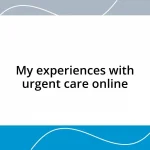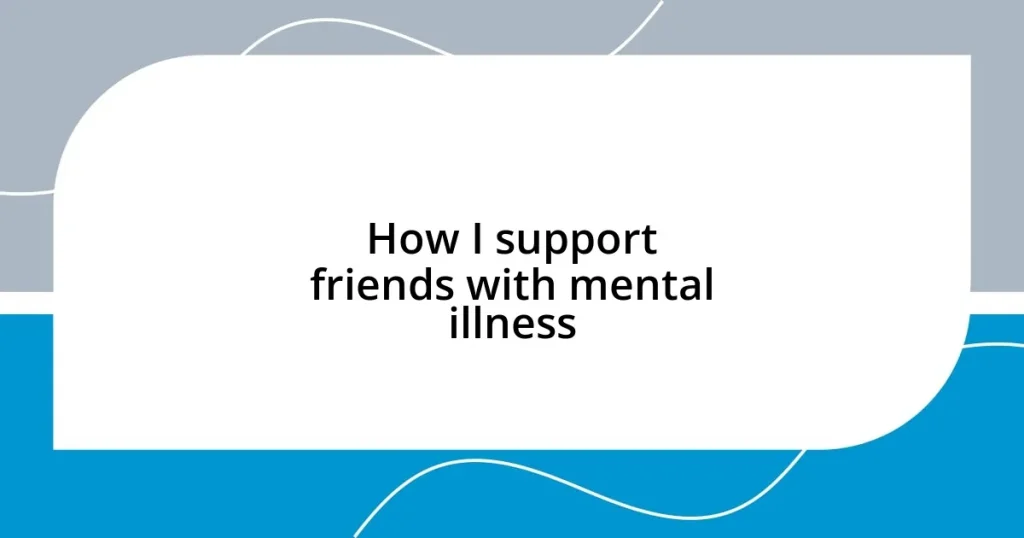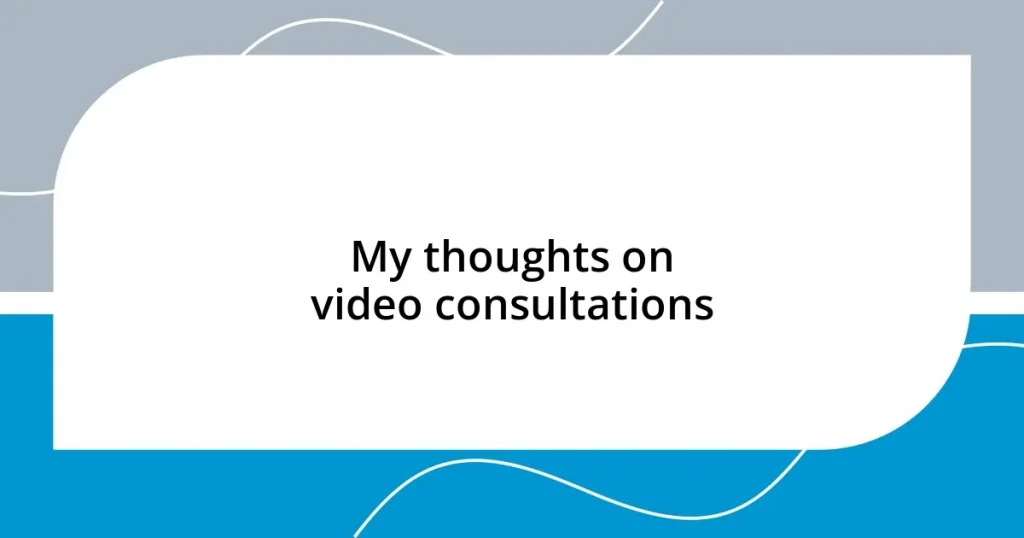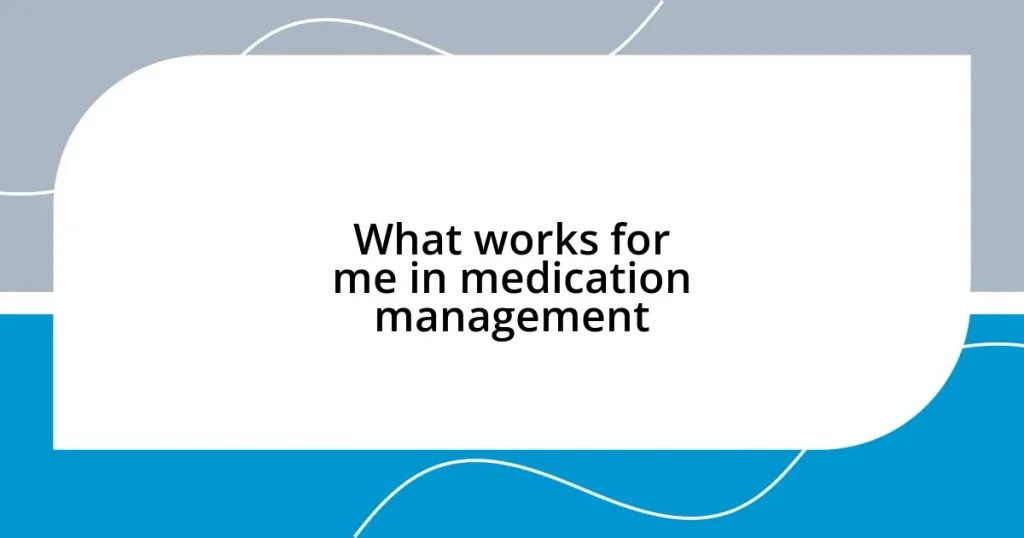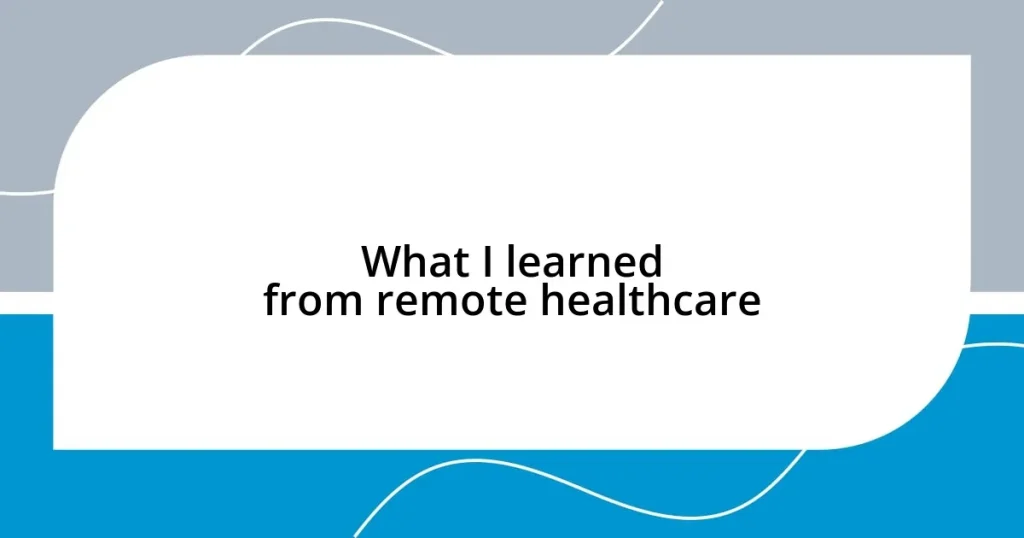Key takeaways:
- Recognizing and understanding varied symptoms of mental illness is crucial for providing effective support to friends.
- Active listening and creating a safe environment foster trust and openness, encouraging friends to share their experiences.
- Encouraging friends to seek professional help is vital; framing it as a strength can alleviate stigma and promote healing.
- Practicing self-care and establishing boundaries for supporters is essential to maintain emotional health and provide effective support.
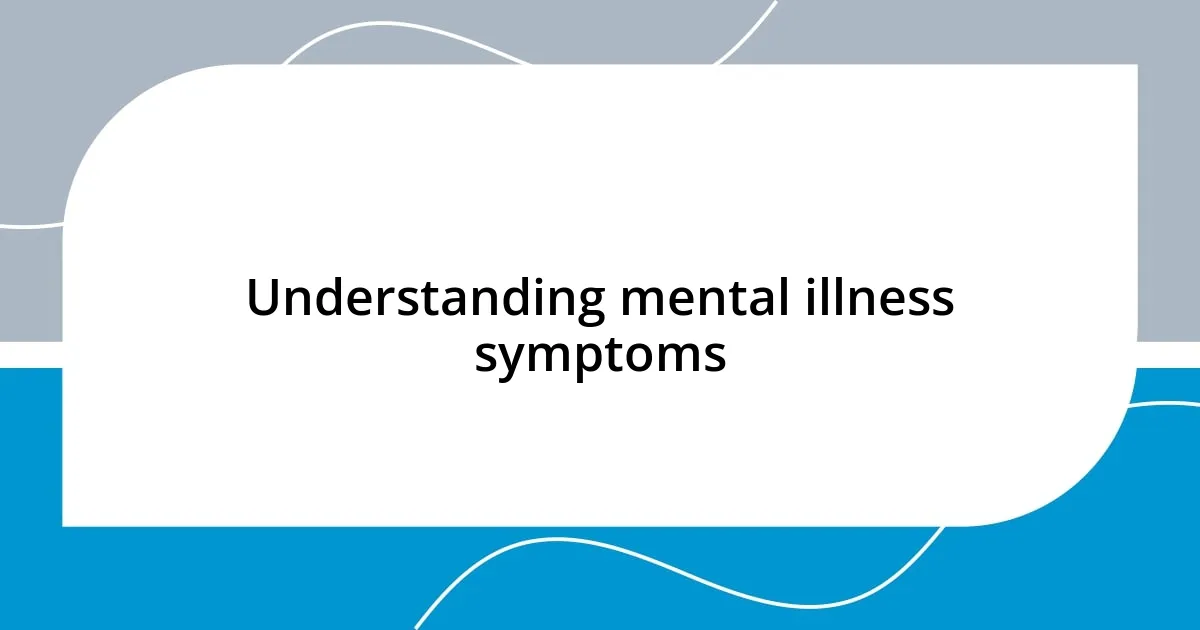
Understanding mental illness symptoms
Understanding mental illness symptoms can sometimes feel overwhelming, especially for those of us who aren’t trained professionals. I remember when a close friend of mine started experiencing significant changes in mood and behavior. At first, I thought it was just stress, but soon it became clear that these symptoms were more complex than I’d anticipated.
It’s crucial to recognize that symptoms can vary widely from person to person. For instance, while one person might grapple with anxiety, another might experience depression that manifests as withdrawal from social situations. Have you ever noticed a friend who suddenly stops engaging in things they once loved? These shifts can be subtle or quite pronounced, but understanding these nuances is essential in providing the right support.
Sometimes, I find myself wondering how I can better recognize these signs in those I care about. Anxiety can sometimes present as irritability, making it easy to misinterpret someone’s mood as a personal affront rather than a cry for help. Learning to differentiate these symptoms not only deepens our empathy but also equips us to be better allies for our friends battling mental illness.
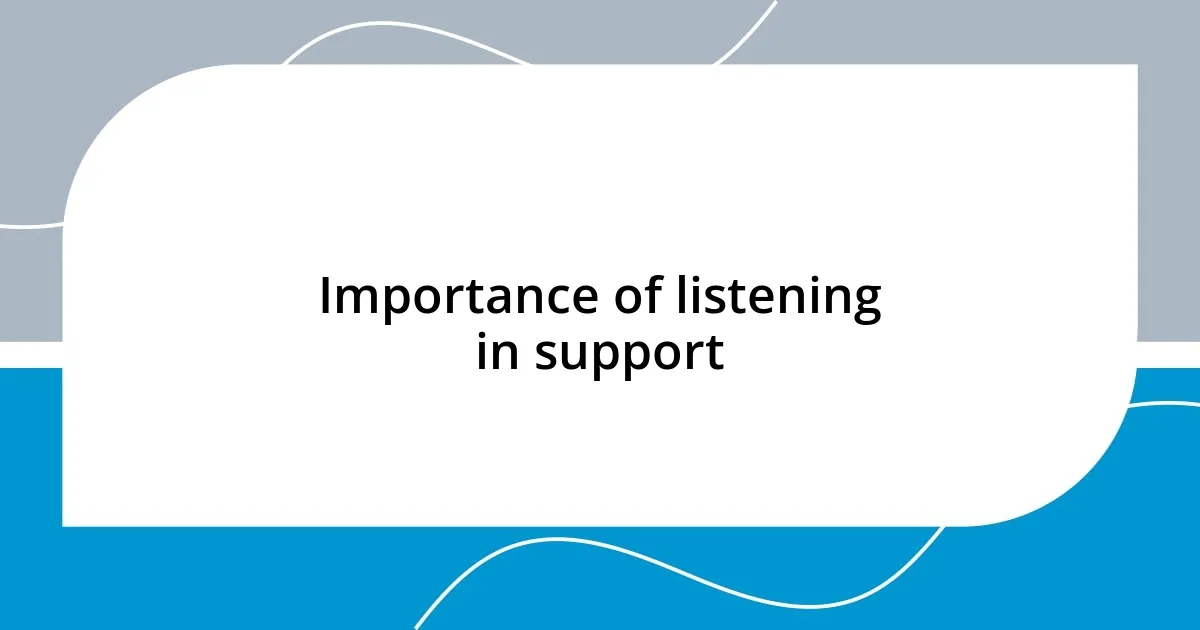
Importance of listening in support
Listening is the cornerstone of supporting friends with mental illness. I can recall a time when a friend opened up to me about their struggles. At that moment, what they needed most wasn’t advice but a compassionate ear. Just being there, fully present, allowed them to express emotions they had bottled up for too long. It’s amazing how much relief can come from simply being heard.
Engaging in active listening during these conversations can deepen the connection between friends. There was a period when another friend faced severe anxiety. Instead of jumping in with solutions, I focused on letting them share their fears without judgment. This experience taught me that sometimes, silence carries more weight than words. By offering that space, we foster trust and openness, which are vital for healing.
Moreover, when we listen, we validate our friends’ experiences. I remember a conversation where my friend expressed feelings of loneliness amid a crowd. Acknowledging their pain helped them feel less isolated, reinforcing that they were not alone in this journey. The simple act of listening not only shows we care but demonstrates our commitment to being there, ready to support them as they navigate their mental health journey.
| Aspect | Listening |
|---|---|
| Active listening | Engagement and empathy |
| Validation | Affirming emotions |
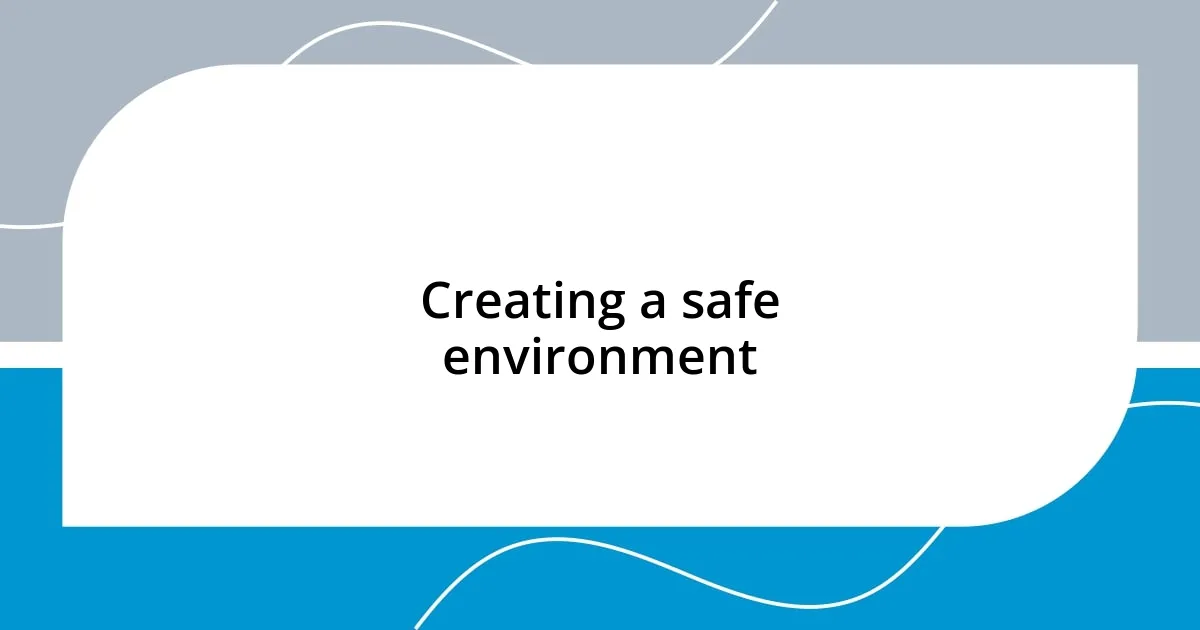
Creating a safe environment
Creating a safe environment for friends dealing with mental illness is essential in my experience. I remember when I started hosting small get-togethers specifically designed for a friend battling anxiety. I made it a rule to keep our gatherings low-stakes and judgment-free, allowing everyone to just be themselves. This simple adjustment made a significant difference; my friend shared that feeling safe helped them engage more openly and enjoyably.
Here are some practical ways to ensure a supportive space:
- Establish ground rules: Encourage open communication by setting guidelines that promote respect and confidentiality.
- Be mindful of triggers: Understand and avoid topics or activities that may provoke distress for your friend.
- Create a comforting atmosphere: Use soft lighting, soothing music, or comfortable seating to foster relaxation.
- Encourage breaks: Allow friends to step away if they need a moment alone, reinforcing that it’s okay to take care of their mental health.
- Provide resources: Keep a few mental health resources or contacts on hand for anyone who might need them during gatherings.
Being proactive in creating this kind of environment not only helps my friends feel cared for but also strengthens our bond. I’ve seen firsthand how a safe space can help someone feel less alone in their experiences.
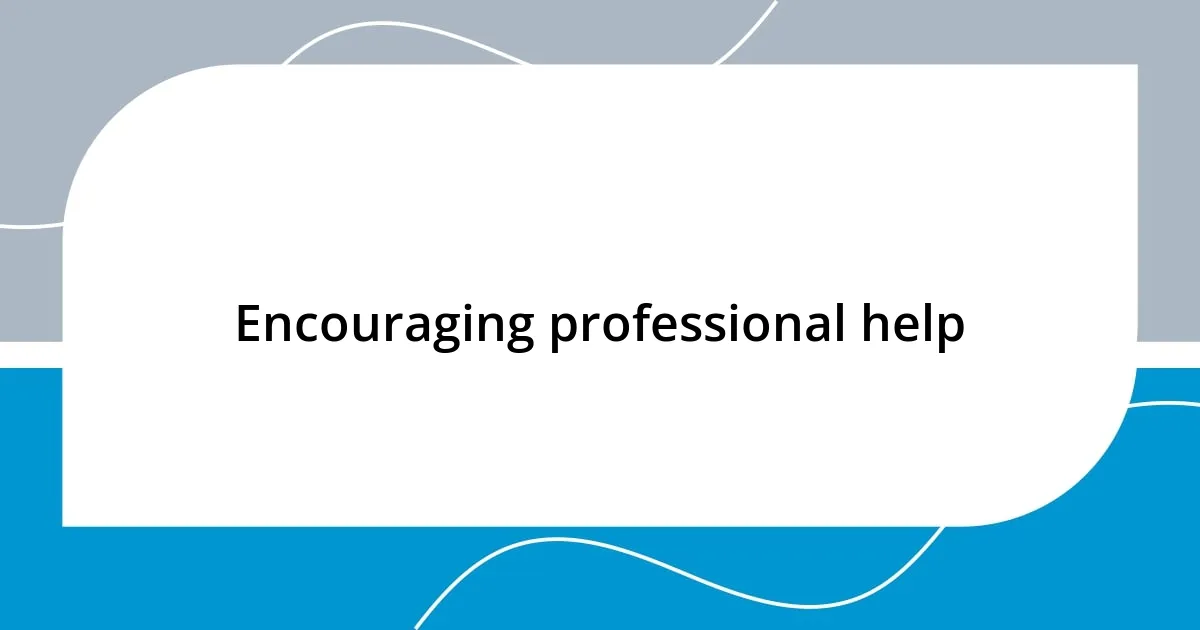
Encouraging professional help
Encouraging friends to seek professional help can be a delicate conversation, but it’s often one of the most crucial steps they can take. I once had a friend who was hesitant to see a therapist due to stigma and misconceptions. After some gentle discussions about the benefits and normalizing the process, I shared my own experiences with therapy, emphasizing how it provided me with valuable tools for managing stress. We often ask ourselves, “What’s the worst that could happen?” but in my experience, taking that first step can lead to tremendous growth and healing.
When broaching the topic, I find it helpful to suggest potential therapists or support groups that align with their needs, based on what I know about them. For example, when a close friend struggled with postpartum depression, I researched options together and encouraged her to look for someone who specialized in that area. Sometimes the right professional can make a world of difference, and it’s rewarding to see a friend take charge of their mental health journey. Have you ever considered how empowering it feels to be part of someone’s path to recovery? It’s truly fulfilling.
It’s essential to reassure friends that seeking help is a strength, not a weakness. I remember telling another friend that my therapist was like a personal trainer for my mind—available to guide us through tough times while we build healthier coping strategies. This kind of framing can help alleviate some fears. If we show our friends that professional help is a resource to lean on, not a sign of failure, we can help them take that vital step towards healing and resilience.
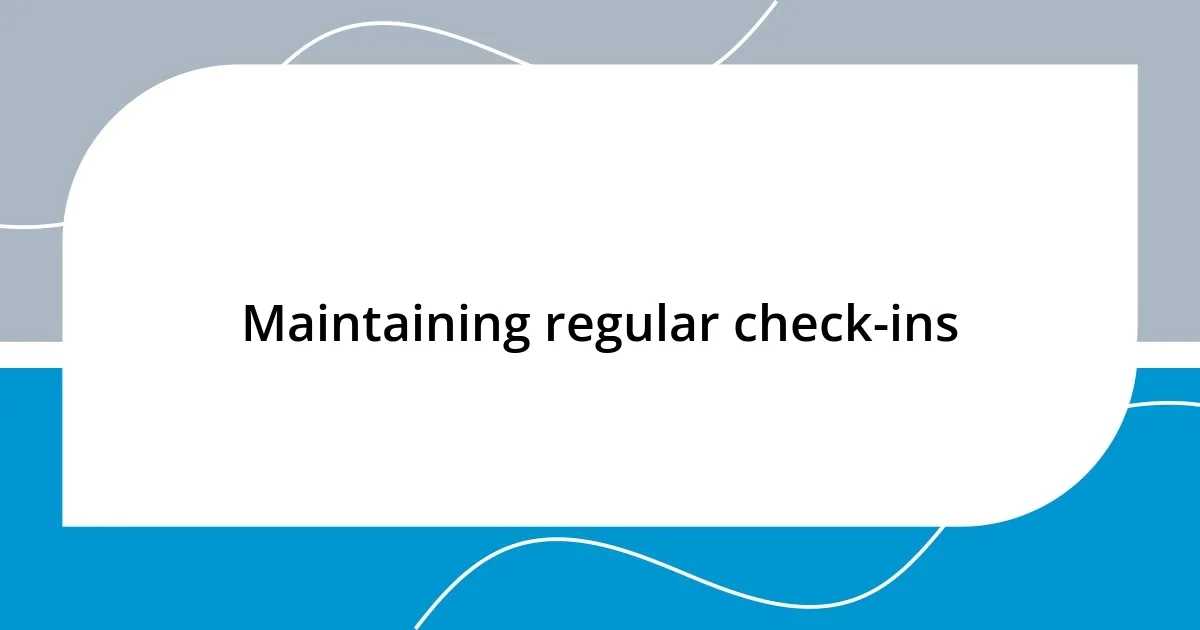
Maintaining regular check-ins
Maintaining regular check-ins with friends who are dealing with mental illness is something I prioritize. I usually set aside a specific day each week to reach out, whether it’s a phone call or a simple text. I’ve found that these small gestures show my friends that I’m here for them, and it can make a world of difference. How often do we underestimate the power of a simple “How are you?” in creating connection?
During one particular period, a close friend of mine was navigating some tough times, and I decided to make it a habit to stop by for coffee every Sunday. It became our little tradition. Those moments weren’t just about talking; they were about simply being together. Sometimes we would chat for hours, while other times, silence was all that was needed. I realized that this consistency helped him feel less isolated and reminded him he was not alone in his struggles.
I’ve learned that the frequency of check-ins should be tailored to each friend’s preferences. Some might appreciate daily texts, while others prefer a longer chat once a week. It’s important to ask what works for them. As I reflect on those moments, I can’t help but think—doesn’t it feel good to know you’re genuinely showing up for someone when they need it most? It’s amazing how deepening these connections can foster a greater sense of support and understanding.
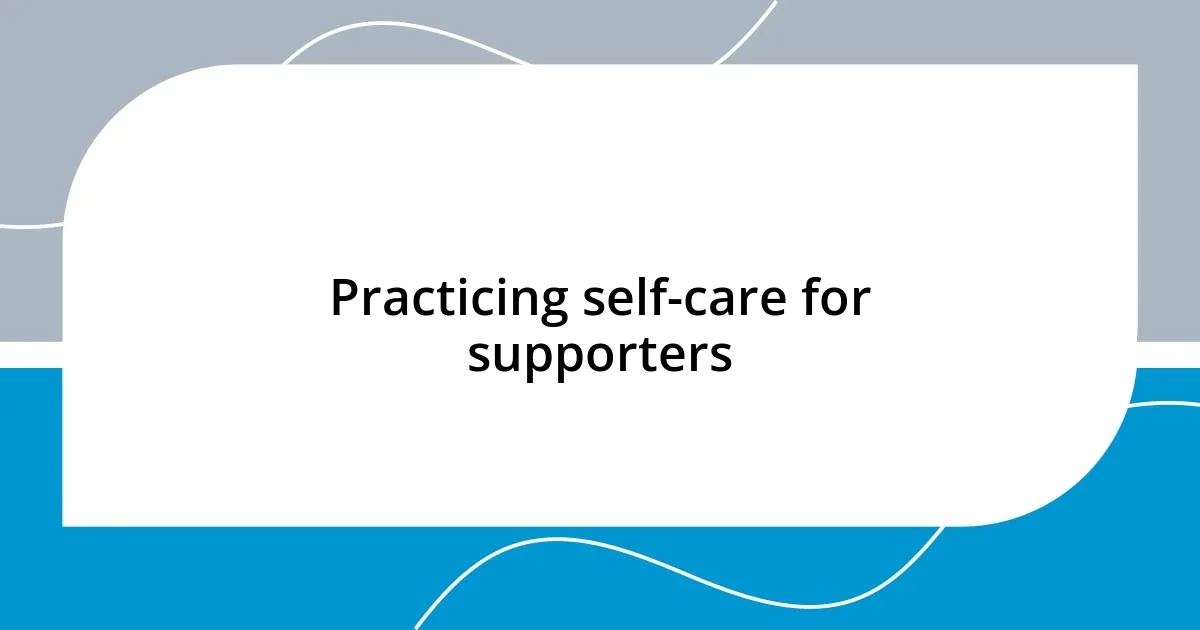
Practicing self-care for supporters
Practicing self-care as a supporter is not just beneficial; it’s essential. I remember a time when I was heavily invested in supporting a friend who was going through a challenging period. I didn’t realize it at first, but my emotional energy was draining, leaving me feeling overwhelmed and burnt out. It was then that I recognized that I can’t pour from an empty cup. Now, I make it a point to carve out time for my own hobbies, whether it’s reading a good book or going for a walk. Have you ever found that taking some time for yourself helps you return to those you support with a refreshed mindset?
Another aspect I value is establishing boundaries. A while back, I was regularly staying up late to listen to a friend’s worries, thinking it was the best way to help. However, this led to my own sleepless nights, affecting my mood and productivity. I learned that it’s okay to say, “I’m here for you, but I also need some time to recharge.” Setting these boundaries doesn’t mean I care any less; it simply allows me to be more present and effective when I am supporting them. Have you considered how boundaries can create a healthier dynamic in your relationships?
It’s crucial to remember that we’re not therapists; we’re friends. I often find solace in connecting with others who understand the balance between support and self-care. Sharing stories with fellow supports creates a sense of camaraderie that reminds me I’m not alone in this journey. Engaging in these conversations can be therapeutic in their own right. What strategies do you find most helpful when navigating the complexities of supporting a friend?
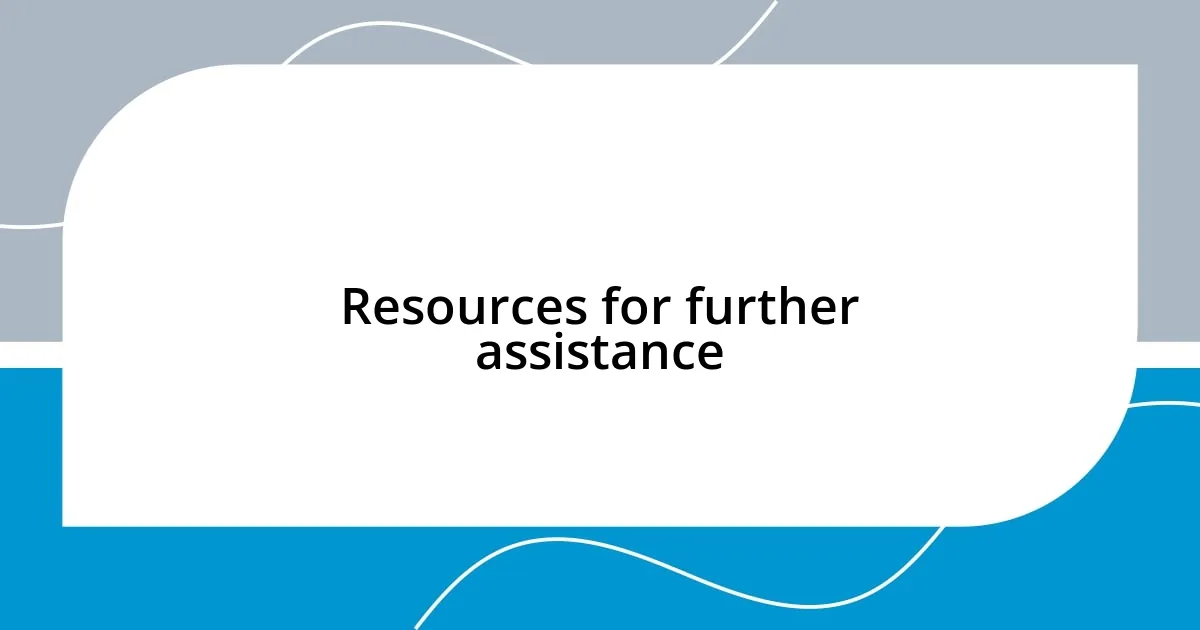
Resources for further assistance
Finding reliable resources for further assistance can be a game changer when supporting friends with mental illness. I often recommend connecting with local mental health services or hotlines; they can provide immediate help and guidance. For instance, I once came across a local support group, and attending a session not only equipped me with information but also allowed me to meet others navigating similar situations. Have you considered how such resources can deepen your understanding?
Another tool I find invaluable is online platforms dedicated to mental health information, like Mental Health America or the National Alliance on Mental Illness (NAMI). They offer extensive resources, educational materials, and community support that empower friends and family members. I remember using their articles and discussions to help educate myself on my friend’s specific struggles, which made our conversations more meaningful. Isn’t it reassuring to know there are professional resources out there that complement the support we provide?
Books can also serve as terrific resources for those wanting to learn more about mental health challenges. I recently read “The Body Keeps the Score” by Bessel van der Kolk, and it offered me profound insights into trauma and healing. I’m always curious: have any books or documentaries significantly shaped your perspective on mental health? Exploring such materials can enrich the support you give while fostering a better understanding of what your friends might be experiencing.










